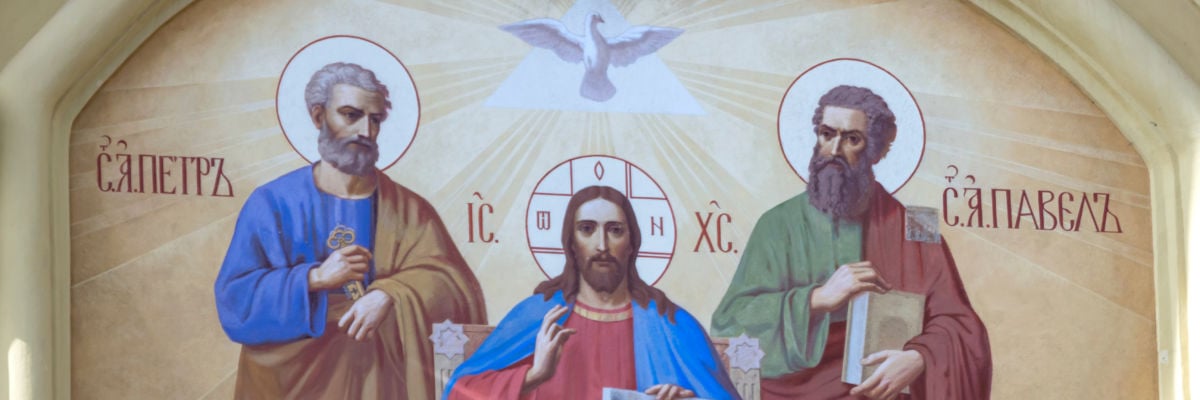
St. Peter and St. Paul were, as St. Augustine said, two men who were one man, but it may be truer to say that they were one man who were two, bearing in their dual persons a single purpose with combined strength of mind, body, and voice. Although people tend to think and say freely that two is better than one, the Lord has a way that must be preferred of uniting his friends to him and to each other.
Though Peter and Paul were not martyred on the same day, they lived and died as twin giants for one Church and share a feast day, befitting their friendship and their leadership. There is something wonderful in these two holy heavyweights sharing a feast, forever shouldering each other like brothers in their zeal for the Father.
Surprise and reversal often follow those who follow the Lord. There was something of the young man’s fire in Peter’s old bones, and something of old man’s wisdom in Paul’s youthful vigor. Together they embodied and balanced the power and presence of the honest poet or the headstrong laborer, which often flung them equally into the extreme of action, error, and love.
When Peter met God on the seashore, he begged him to depart, only to go with him. When Peter saw the Christ walking on water, he vaulted over the side of the boat to join him, only to sink like a rock. Peter refused to have Jesus wash his feet but then begged him to wash his hands and head as well. Peter slashed with his sword in the garden like a hero, but like a fool, he hewed at a servant instead of a soldier. At supper, Peter swore to be faithful to the last drop of his blood; after supper, he swore three times over that he didn’t know his friend. Then, when asked three times over if he loved his Lord, he answered with tremulous distress each time at having to answer at all—but thereby he went from feeding lambs to feeding sheep, assuming a complete pastoral scope from the Good Shepherd himself.
Paul pursued a similar path of shocks. When called Saul, making to strike down the Christians, he was struck down by Christ and rose up as Paul, ready to pour the energy of his hate and persecution into love and devotion. He spoke like a good rabbi in order to be a good priest, settling squabbles while setting a bedrock theology. Paul founded many churches so that there might be one Church, and his trade as a tentmaker proved ironic for one who was to live out of tents to spread the gospel. Paul lost his head in death, and he lost it occasionally in life as well, driving out devils with the force of his irritation, even rebuking his pope in the famous Antioch affair, showing the kinship of comrades in arms. Paul boldly fixed the hearts and the heads of Jews and Gentiles on Christ—at the price of his own head, but never his enduring heart.
Peter was called Fisher of Men, yet he dangled upside-down from his crazy cross like a fish. Paul was a chieftain among the apostles, yet he never knew Christ in the flesh, and he dangled for his life in a basket like a bit of laundry.
In all their adventures, Peter and Paul lived passionately and precariously between heaven and earth, dependent upon the man they knew was the Son of the living God, a thing they knew by a strange instinct or intuition—by faith. The great teachers are often depicted with a dove whispering in their ear and the great conquerors astride a noble charger. The first pope should be depicted with a cock crowing with the thunder of dawn in his ear, while the first preacher should be depicted tumbling from his horse down the road to Damascus.
Peter and Paul learned that the Messiah came to bring not peace, but a sword, and that to be a disciple of Jesus Christ was not something that made a great deal of earthly sense—but it made a great deal of heavenly sense. Following in the footsteps of our Lord has never been a simple or even a reasonable task—much more so for his friends. It made no practical sense for either of these practical characters to adhere to a man who promised to give his flesh and blood as food and drink for the life of the world. Yet they did, unto their salvation.
These are the kind of counter-intuitive proposals our Lord challenges his disciples to believe, and thickheaded, brilliant Peter and Paul met their master’s challenge sufficiently to be, together, the first among the apostles. Together, they understood that Christ sometimes asks that we act against what right reason seems to dictate and trust in a higher reason that may not seem reasonable at all. For many, this is a fearful mandate, but Peter was ready to walk on water if it meant walking with his God, and Paul was ready to travel the known world and write to the rest of it if it meant resting with his God.
Peter and Paul are pillars that hold up the doorway of the Church, and a pillar must always have a partner. So staunch are they that the rest of the faithful must celebrate their feast days together as one. They shared their life for the Faith, and so, to this day, they share it also in the observation of their glorious entrance into life eternal.



